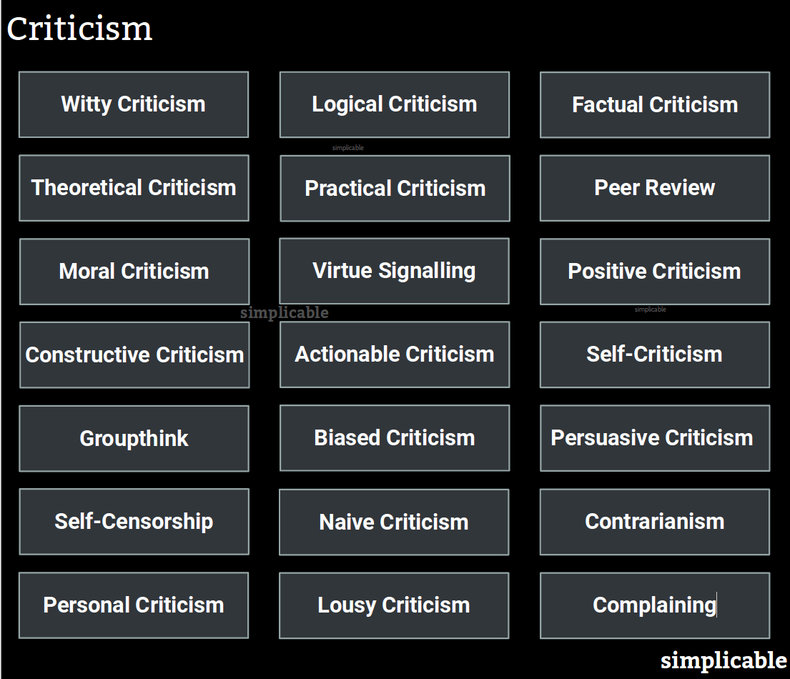
Witty Criticism
Criticism that is delivered at speed in response to a situation. In many cases, criticism is cutting and painful such that it is designed to dominate others in conversation and debate. It is also possible for witty criticism to humorous, lighthearted and friendly.Logical Criticism
Criticism based on a logical argument or the identification of fallacies.Factual Criticism
Questioning the factual basis of something. For example, questioning an assumption of cause and effect in a data analysis.Theoretical Criticism
Criticism of a theory based on factors such as its usefulness, explanatory power, predictive power and supporting evidence.Practical Criticism
Criticism that seeks immediate results and actionable ideas as opposed to broad theories or objections that aren't immediately valuable to a goal. For example, a manager who criticizes an employee's performance goals because they are neither measurable nor relevant to the organization's goals.Peer Review
Peer review is a formal process of criticism that is used to validate work by exposing it to criticism from peers. For example, a scientist submits a paper to a journal for publication. Before publishing, the editor of the journal requires the paper to be reviewed by several well known scientists in the same field. If rejected, the author of the paper can incorporate feedback from the reviewers and resubmit.Moral Criticism
Applying principles concerning right and wrong. For example, criticising a new product that is likely to cause pollution, health or safety risks.Virtue Signalling
Virtue signalling is moral criticism of others designed to demonstrate that you are morally superior. For example, an advertisement that criticizes bad behavior that has nothing to do with the product or company.Positive Criticism
Criticism is the process of judging things. These judgements can be positive and encouraging as opposed to finding fault.Constructive Criticism
Constructive criticism is an approach to criticism that seeks to build ideas up as opposed to tearing them down. For example, a coach who points out an athlete's potential that has not yet been realized as opposed to current failures.Actionable Criticism
Criticism that points to things that can be done to solve problems or improve. This is may be more valuable than criticism that finds fault without any proposed path to fix things.Self-Criticism
The ability to objectively examine your own character, motives, ideas, decisions, behavior, strategy, work and performance. A foundational type of thought that is necessary for personal improvement.Groupthink
Criticism that carefully adheres to the ideology of a group as opposed to being an authentic and candid judgement.Biased Criticism
Criticism that is motivated by a desire to push an agenda or that is influenced by cognitive biases.Persuasive Criticism
Criticism that is framed and delivered to convince an audience. For example, a public speaker who criticizes an education system in a way that is carefully crafted to influence the opinions of the audience.Self-Censorship
Holding back on criticism in order to avoid repercussions. For example, a country where the media may not strongly criticise the government without facing punishment based on unwritten rules that have been established as norms.Naive Criticism
Criticism that misses the point due to a lack of knowledge, due diligence, practical experience or understanding. For example, a person with little knowledge of biology or medicine who criticizes a medical treatment based on their limited understanding of the treatment's risks and efficacy.Contrarianism
Contrarianism is a tendency to challenge mainstream and accepted thinking. This may be based on skeptical arguments that lack objectivity such as using obscure opinions to challenge authoritative opinions that have far more evidence behind them. In some cases, contrarian criticism turns out to be right due to factors such as groupthink that can cause the majority to adopt ideas that are based on faulty assumptions that are defended with zeal such that they aren't validated or challenged properly.Personal Criticism
Attacking a person as opposed to their ideas, work or behavior. This may be considered bad form and mean-spirited. For example, a film critic who suggests a director is old, out of ideas and devoid of passion as opposed to sticking to faults in the film itself.Lousy Criticism
Poor quality criticism that is long, tedious, self-righteous, mean-spirited, personal, vague, irrelevant, illogical, non-actionable, poorly researched, naive, cowardly or untruthful.Complaining
Criticism is designed to solve problems and contribute to knowledge. Complaining is often designed to vent negative emotions such as envy and self-pity. It is difficult to tell the two apart because it is common for those who complain to claim that they are offering valuable criticism.| Overview: Criticism | ||
Type | ||
Definition (1) | The process of formulating and communicating judgements. | |
Definition (2) | The process of formulating and communicating judgements designed to solve problems and contribute to knowledge. | |
Related Concepts | ||
























